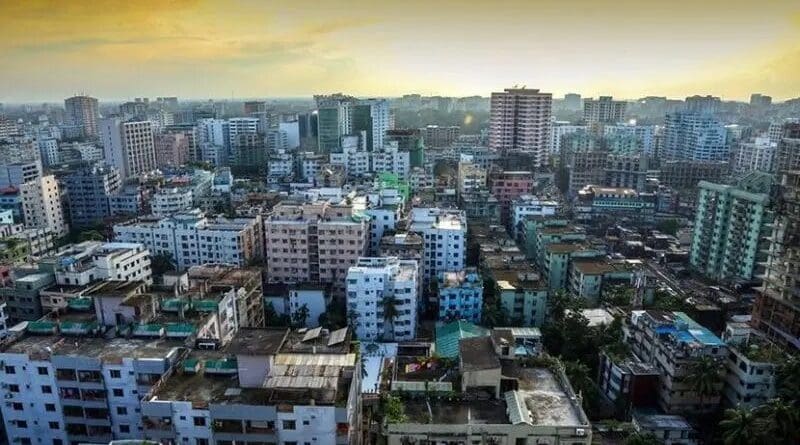IMF Provisionally Agrees To Loan Bangladesh $4.5B To Shore Up Economy
By BenarNews
By Riyad Hossain
The International Monetary Fund announced Wednesday that it had preliminarily agreed to give Bangladesh a U.S. $4.5 billion loan to help its economy stay afloat amid high inflation and challenges posed by climate change.
The world lending agency had provisionally agreed to a $3.2 billion loan for the South Asian nation under its Extended Credit Facility through a 42-month arrangement, a visiting IMF delegation said.
The IMF would lend the remainder under its Resilience and Sustainability Facility, which provides longer-term financing, the delegation said, noting that the fund’s management and board still had to approve the loan package.
“Bangladesh’s robust economic recovery from the pandemic has been interrupted by Russia’s war in Ukraine, leading to a sharp widening of the current account deficit, rapid decline of foreign exchange reserves, rising inflation and slowing growth,” Rahul Anand, the IMF official who led the delegation, said in a statement announcing the provisional loan as his team wrapped up a two-week visit to Bangladesh.
“Even as Bangladesh tackles these immediate challenges, addressing long-standing structural issues remains critical, including threats to macroeconomic stability from climate change,” he said.
For Bangladesh to meet its target of graduating from the status of a Least Developed Country by 2031, “it is important to build on past successes and address structural issues to accelerate growth, attract private investment, enhance productivity, and build climate resilience,” he added.
Abdur Rouf Talukder, governor of Bangladesh’s central bank, said the country’s foreign exchange reserves stood at $34.3 billion, down from an all-time high of $48.06 billion in August 2021, and $46.49 billion a year previously, according to the Reuters news agency.
In August, Bangladesh hiked fuel prices by a whopping 50 percent, and diesel by 42.5 percent. In September, the country’s inflation rate hit 9.1 percent, up from 5.59 percent a year previously, according to figures from Bangladesh Bank, the central bank.
“Against this backdrop, and following initial measures to maintain macroeconomic stability, the authorities have put together a program – supported by the IMF – that is expected to bolster its external position, reduce vulnerabilities, and prepare the ground for a robust and inclusive growth pick-up by scaling up much-needed social, development and climate spending,” Anand said.
Bangladesh, a $416 billion economy, requested an IMF loan in July, because “the heat of the global economy has affected us to some extent,” said Finance Minister A. H. M. Mustafa Kamal, referring to food and oil prices spiraling after Russia invaded Ukraine in February.
“We requested the IMF loan as a precautionary measure to ensure that this volatility does not escalate into a crisis,” the minister told journalists after meeting with the IMF delegation in Dhaka on Wednesday.
“They have laid down the necessary conditions, which we were initiating ourselves. … $447.78 million, the first installment of the loan, will be cleared in February next year.”
Kamal also said that interest rates on the loan would be based on market rates, where the average interest rate now stands at around 2.2 percent.
Economist Ahsan H. Mansur said the approval of the IMF loan would be positive for Bangladesh’s economy.
“It will help bring relief to the economy,” Mansur, executive director of the Policy Research Institute of Bangladesh, told BenarNews.
“The reforms discussed [by the IMF] in the country’s financial sector are nothing new – the IMF suggested these earlier, we have also said the same. It is not because the IMF has prescribed [them], these reforms should be done by the government to solve its own problems.”
Among the reforms suggested were ending fertilizer subsidies and fuel prices’ alteration, according to Talukder, the central bank chief.
“The IMF had recommended the withdrawal of fertilizer subsidies. But we could convince them that the subsidy is important to ensure food security,” Talukder told reporters.
“The IMF also suggested periodically adjusting fuel prices in line with global market prices, so we can reduce oil prices when the rates fall in the international market.”
According to the IMF statement, key elements of a program to maintain economic stability that the Bangladesh authorities have agreed to are: higher revenue mobilization, taming non-performing loans, containing inflation, supporting large-scale climate investments, and increasing growth-enhancing spending.
Kamal, the finance minister, said the government was modernizing the revenue collection system by setting up Electronic Fiscal Devices (EFD) for the collection of value added tax.
“So far 6,732 EFD machines have been installed and 60,000 more machines will be installed in the next year, which will result in increased revenue collection,” he said.

